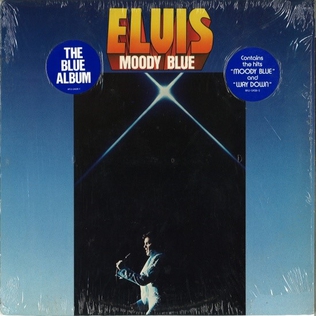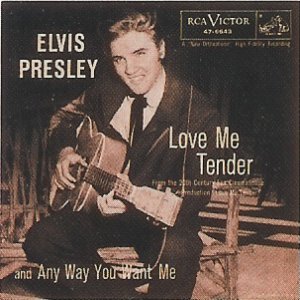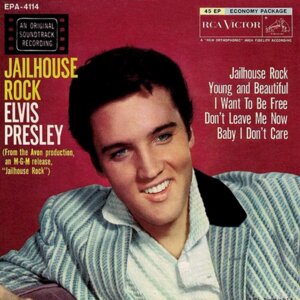
Elvis Aaron Presley, or simply Elvis, was an American singer and actor. Dubbed the "King of Rock and Roll", he is regarded as one of the most significant cultural figures of the 20th century. His energized interpretations of songs and sexually provocative performance style, combined with a singularly potent mix of influences across color lines during a transformative era in race relations, led him to both great success and initial controversy.
Elvis Presley (1935–1977) was an American singer and actor.

"All Shook Up" is a song recorded by Elvis Presley, published by Elvis Presley Music, and composed by Otis Blackwell. The single topped the U.S. Billboard Top 100 on April 13, 1957, staying there for eight weeks. It also topped the Billboard R&B chart for four weeks, becoming Presley's second single to do so, and peaked at No. 1 on the country chart as well. It is certified 2× platinum by the Recording Industry Association of America.

Moody Blue is the twenty-fourth and final studio album by American singer and musician Elvis Presley, released on July 19, 1977 by RCA Records, four weeks before his death. The album was a mixture of live and studio work, and included the four tracks from Presley's final studio recording sessions in October 1976 and two tracks left over from the previous Graceland session in February 1976. "Moody Blue" was a previously published hit song recorded at the earlier Graceland session and held over for this album. Also recorded at the February session was "She Thinks I Still Care". "Way Down" became a hit after Presley's death less than one month after this album's release. The album was certified Gold and Platinum on September 12, 1977, and 2× Platinum on March 27, 1992, by the RIAA.

"Love Me Tender" is a 1956 ballad song recorded by Elvis Presley and published by "Elvis Presley Music" from the 20th Century Fox film of the same name. Lyrics are credited to "Vera Matson" and Elvis Presley himself. The melody is identical to the sentimental Civil War ballad "Aura Lea" and therefore credited to Aura Lea's composer, the Englishman George R. Poulton. The RCA Victor recording by Elvis Presley was No. 1 on both the Billboard and Cashbox charts in 1956.

Elvis in Concert is the live album released by RCA Records in October 1977 in conjunction with the television special of the same name which featured some of the final performances of American singer and musician Elvis Presley. Videotaped and recorded in June 1977, both the special and album were broadcast and released on October 3, six weeks after Presley's death. The album peaked at No. 5 on the Billboard chart in late 1977. It was certified Gold and Platinum on October 14 and 3× Platinum on August 1, 2002, by the RIAA.
"Love Letters" is a 1945 popular song with lyrics by Edward Heyman and music by Victor Young. The song appeared, without lyrics, in the movie of the same name performed by Dick Haymes, and was nominated for the Academy Award for Best Original Song in 1945 but lost out to "It Might as Well Be Spring". The song has been covered by a number of artists, most notably by Ketty Lester (1961), Elvis Presley (1966), and Alison Moyet (1987).

Elvis is the second studio album by American rock and roll singer Elvis Presley. It was released through RCA Victor on October 19, 1956 in mono. Recording sessions took place on September 1, September 2, and September 3 at Radio Recorders in Hollywood, with one track left over from the sessions for Presley's debut album at the RCA Victor recording studios on January 30 in New York. It spent four weeks at #1 on the Billboard Top Pop Albums chart that year, making Presley the first recording artist to have both albums go straight to number one in the same year. It would go on to spend 5 weeks at #1 in total. It was certified Gold on February 17, 1960, and Platinum on August 10, 2011, by the Recording Industry Association of America.

Elvis' Golden Records is a compilation album by American rock and roll singer Elvis Presley, issued by RCA Victor in March 1958. It compiled his hit singles released in 1956 and 1957, and is widely believed to be the first greatest hits album in rock and roll history. It is the first of five RCA Victor Elvis' Golden/Gold Records compilations, the first four of which were issued during Presley's lifetime. The album peaked at number three on the Billboard Top Pop Albums chart and was certified 6× platinum on August 17, 1999, by the Recording Industry Association of America.

Elvis In Concert is a posthumous 1977 television special starring Elvis Presley. It was Elvis' third and final TV special, following Elvis and Aloha From Hawaii. It was filmed during Presley's final tour in the cities of Omaha, Nebraska, on June 19, 1977, and Rapid City, South Dakota, on June 21, 1977. It was broadcast on CBS on October 3, 1977, two months after Presley's death. It was transmitted by the BBC in the United Kingdom on June 9, 1978. Unlike the majority of Elvis' programs, it is unlikely to be commercially released on home video and is only available in bootleg form. This is because it showed Elvis near the end of his life when he was overweight and addicted to prescription drugs, and much of his performance reflects his poor health. However, parts of the special were used in the video documentary Elvis: The Great Performances and the theatrical documentary This is Elvis, both of which were released on home video. Parts of the special were recreated for the movie Elvis, specifically Presley's performance of "Unchained Melody".

Elvis for Everyone! is the eighth studio album by American singer and musician Elvis Presley, issued by RCA Victor in mono and stereo, LPM/LSP 3450, on August 10, 1965. Recording sessions took place over a ten-year span at Sun Studio in Memphis, RCA Studio B in Nashville, Tennessee, and Radio Recorders in Hollywood, California. It peaked at number 10 on the Top Pop Albums chart.
"Big Boss Man" is a blues song first recorded by Jimmy Reed in 1960. It became one of his most popular songs, although the songwriting is credited to Luther Dixon and Al Smith. It one of Reed's last appearances on the record charts and other artists have also had chart successes with the song.

Jailhouse Rock is an EP by American singer Elvis Presley, featuring songs from the movie of the same name. It was released by RCA Victor, with catalogue EPA 4114, on October 30, 1957. Recording sessions took place at Radio Recorders in Hollywood on April 30 and May 3, 1957, with an additional session at the Metro-Goldwyn-Mayer Soundstage in Hollywood on May 9 for "Don't Leave Me Now". It peaked at #1 on the newly inaugurated Billboard EP chart where it remained at #1 for 28 weeks. The EP album was the best selling EP album of 1958 according to Billboard.

"Suspicion" is a 1962 song originally recorded by Elvis Presley written by Doc Pomus and Mort Shuman which became a major hit in 1964 in a recording by Elvis Presley sound-alike Terry Stafford.

"Anyway You Want Me" is a country-dance song by the Swedish band Rednex, released on March 7, 2007 via Universal Records, as the third single of their independently released third studio album The Cotton Eye Joe Show.
"Tryin' to Get to You" is a song written by R&B singer songwriters Rose Marie McCoy and Charles Singleton. It was originally recorded by the Washington DC vocal group The Eagles in 1954 and released in mid-1954 on Mercury Records 70391. The format of the title on The Eagles’ record was “Tryin’ to Get to You”, with an apostrophe.

Frankie and Johnny is the twelfth soundtrack album by American singer and musician Elvis Presley, released on RCA Victor Records in mono and stereo, LPM/LSP 3553, on March 1, 1966. It is the soundtrack to the 1966 film of the same name starring Presley. Recording sessions took place at Radio Recorders in Hollywood, California, on May 12, 13, and 14, 1965. It peaked at number 20 on the Top LP's chart. It was certified Gold and Platinum on January 6, 2004 by the Recording Industry Association of America.
"Any Way You Want Me" is a song written by Aaron Schroeder and Cliff Owens and originally recorded and released by Elvis Presley.
"Patch It Up" is a song written by Eddie Rabbitt and Rory Bourke and originally recorded by Elvis Presley. He released it as a single, with "You Don't Have to Say You Love Me" on the opposite side, in October 1970.











